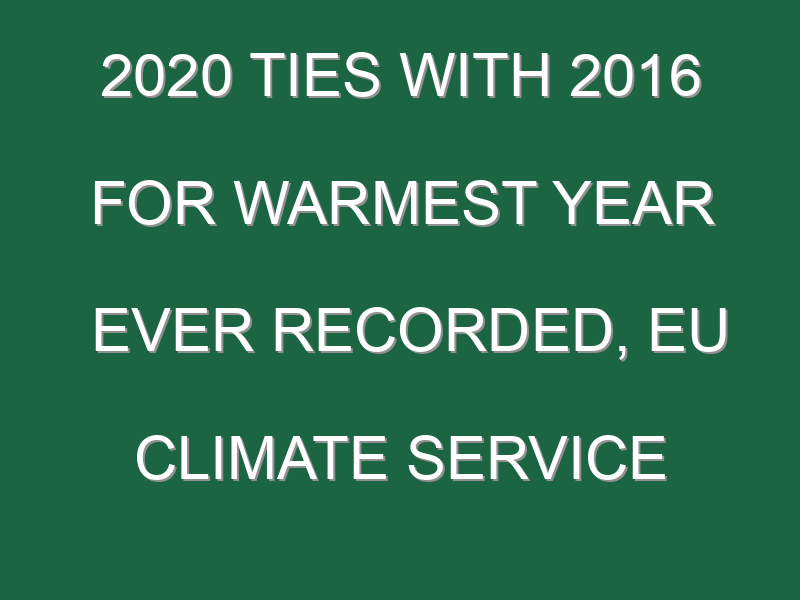As years go, 2020 was a record breaker on many levels: chaotic, surprising, bizarre—and sweltering.
Even as much of the globe submitted to lockdowns and business activity ground to a halt for weeks or months at a time, the global thermometer still ticked upwards: last year was the hottest year on record, tied with the scorcher of 2016, according to the European Union’s earth observation service.
Only a relatively cool December compared to 2019 prevented 2020 from being the standalone hottest year on record, the Copernicus Climate Change Service reported on Friday—despite huge drops in emissions year-on-year, largely due to massive dents to global transport. It’s also notable that 2020’s heat occurred during a La Niña year, typically a cooler year for global temperatures.
This is not a single-year phenomenon. 2020 concluded the hottest decade on record, the service says, and marks five straight years of exceptionally warm weather. For some regions, it was a flat-out record breaker: Europe, for example, has never been hotter.
And despite lockdowns, which slowed the pace of carbon being contributed to the atmosphere, the overall carbon concentration still ticked upwards: in May 2020, as much of the world was emerging from lockdowns, levels hit an all-time record of 413 parts per million.
Regionally, there were signs of dramatic extremes. The year started out with terrifying wildfires in Australia, and a record for the number of “named” hurricanes: Louisiana alone was hit by five. Typhoons and floods hit much of Southeast Asia; California and the Amazon saw their own out of control fires; Siberia was bizarrely balmy for long stretches of the year, and the Arctic sea levels were the lowest on record for July and October, respectively.
The Copernicus center is only one government organization that tracks temperature records—NASA’s Climate Center, for example, also typically makes an announcement in mid-January. Those assessments sometimes differ, noted the Center, but the general consensus is clear: the world is becoming disastrously hot.
“I think the focus on whether 2020 is the hottest year on record misses the bigger point,” says Dr. James Marshall Shepherd, a distinguished professor and director of the Atmospheric Sciences program at the University of Georgia, in a comment. “We are in an era of sustained record breaking years. This is no longer breaking news, but a human crisis.”
That reality was evident in the thousands of lives lost in extreme weather events over 2020, as well as the mounting costs. SwissRe, the reinsurer that closely tracks climate change risk, said in December that 2020 was expected to be the fifth costliest year on record since 1970, with insurance industry losses estimated at $83 billion year, driven by record levels of storms and wildfires.
But despite the focus on grappling with the pandemic, the world did not totally forget about the perils of rising temperatures in 2020.
For one, scientists have placed some of the blame for COVID-19 on climate change, as huge losses in biodiversity and the encroachment of humans on nature has led to a dramatic, but predictable, jump in the risks that viruses will jump from animals to people, as Fortune reported in April last year.
And for the millions forced to shelter from natural disasters as well as the virus, it was impossible to ignore. In the realms of policy and business, 2020 overturned conventional wisdom about what level government intervention and stimulus was acceptable to forestall certain disaster.
Radical lifestyle changes, and huge government spending—the kinds of interventions climate experts have long warned are necessary to halt rising temperatures and shift to clean energy systems—became a fact of life.
The cost to make the changes needed to address climate change would be far less than the amount governments are currently spending to keep businesses and individuals afloat through the pandemic, argues Dr. Karsten Haustein, a scientist at the Climate Service Center Germany.
“Once we are faced with an emergency situation, seemingly impossible (financial) action is suddenly taken at unprecedented scale,” he said in a comment reacting to the announcement.
In the EU, that action has come in the form of stimulus and recovery packages that skew heavily green, and tightened emissions standards for the entire bloc. In the U.S., the incoming Biden administration has pledged to rejoin the Paris Agreement, and to put momentum behind clean energy incentives. The Democrats will have more leeway to pass such measures after taking control of the Senate, after winning two seats in the Georgia runoffs earlier this week.
Other countries, from South Korea to Canada, have also pledged to hit “net zero” emissions by 2050, and use government programs to do so. But climate experts argue that in order to stop the coming years from bringing yet more terrifying records, 2021 is the year when such targets must be followed by concrete action.
More must-read stories from Fortune:
- Democrats plan to use Senate win to pass $2,000 stimulus checks
- Betting odds heavily favored Georgia’s GOP candidates, then suddenly collapsed. What went wrong?
- COVID vaccine recipients may still be infectious. When will we know for sure?
- The biggest conspiracy theories of 2020 (and why they won’t die)
- A brief history of Bitcoin bubbles



